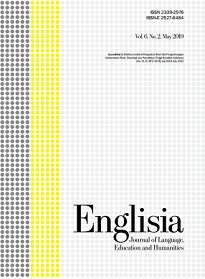STUDENTS’ MOTIVATION AND RESPONSIVE PEDAGOGY IN LANGUAGE CLASSROOM
DOI:
https://doi.org/10.22373/ej.v6i2.4601Keywords:
Students’ motivation, responsive pedagogy, language classroomAbstract
Students’ motivation contributes to the successful teaching learning process as it determines self-engagement and participations in the classroom. Encouraging students’ motivation, then, becomes important for the teacher to achieve the teaching goal and to provide a meaningful learning process for the students. This research is aimed to discuss responsive pedagogy in encouraging students’ motivation to learn and participate in classroom learning process. One English speaking class becomes the object of the observation. The interviews with the teacher and some students were also part of data collection in order to obtain information about the students’ motivation in learning English speaking, teacher’s teaching strategy, and classroom interactions. The findings indicate that classroom activities are crucial in motivating students’ responsive learning. In addition, the teacher’s competency in creating a conducive environment and leading an interactive communication are the ways of the teacher influence students’ motivation in learning process.
Downloads
References
Brown, H. D. (2007). Teaching by Principles: an interactive approach to language pedagogy. New York: Pearson Education Inc.
Clement, R., Dörnyei, Z., & Noels, K. A. (1994). Motivation, self-confidence, and Group cohesion in the Foreign Language Classroom. Language Learning, 44(3), 417-448.
Denzin, N. K., & Lincoln, Y. S. (2013). The landscape of qualitative research (fourth ed.). Thousand Oaks, CA: SAGE Publications, Inc.
Dörnyei, Z. (1998). Motivation in second and foreign language learning. Language Teaching, 31(3), 117-135.
Dörnyei, Z., & Csizer, K. (1998). Ten Commandments for motivating language learners: results of an empirical study. Language Teaching Research, 2(3), 203-229.
Gorman, P. (2004). Motivation and Emotion. London: Routledge Publishers.
Guilloteaux, M. J., & Dornyei, Z. (2008). Motivating Language Learners: a classroom-oriented investigation of the effects of motivational strategies on student motivation. TESOL QUARTERLY, 42 (1), 55-75.
McEwan, E. K. (2002). 10 traits of highly effective teachers. Thousand Oaks, CA: Corwin Press,Inc.
Rost, M. (2006). Generating student motivation. Series Editor of Worldview, Pearson Education, Inc., 1-4.
Ryan, R.M., & Deci, E.L. (2000). Intrinsic and extrinsic motivations: classic definitions and new directions. Contemporary Educational Psychology, 25, 54-67.
Stronge, J. H., & Xu, X. (2012). What makes effective teachers effective?. CSE, 16(1), 1-11.
Stronge, J. H. (2002). Qualities of effective teachers. Alexandria, VA: Association for supervision and curriculum development.
Ushioda, E. (2008). Motivation and Good Language Learners. In Carol Griffiths (ed.), Lesson from Good Language Learners. Cambridge: Cambridge University Press.
Woolfolk, A. (2007). Educational psychology. Boston: Allyn and Bacon.
Yin, R. K. (2003). Case study research: design and methods. Thousand Oaks, CA: Sage Publication
Downloads
Published
Issue
Section
License
Proposed Policy for Journals That Offer Open Access
Authors who publish with Englisia journal agree to the following terms:
- Authors retain copyright and grant the journal right of first publication with the work simultaneously licensed under a Creative Commons Attribution License that allows others to share the work with an acknowledgement of the work's authorship and initial publication in this journal.
- Authors are able to enter into separate, additional contractual arrangements for the non-exclusive distribution of the journal's published version of the work (e.g., post it to an institutional repository or publish it in a book), with an acknowledgement of its initial publication in this journal.
- Authors are permitted and encouraged to post their work online (e.g., in institutional repositories or on their website) prior to and during the submission process, as it can lead to productive exchanges, as well as earlier and greater citation of published work (See The Effect of Open Access).









